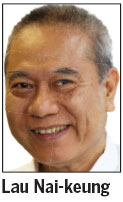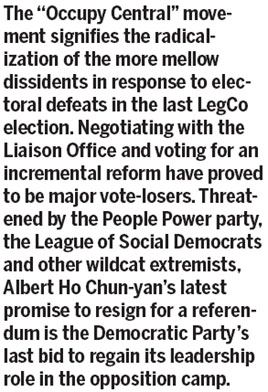Radicalization of opposition
Updated: 2013-03-19 05:30
By Lau Nai-keung(HK Edition)
|
|||||||

The situation in Hong Kong is deteriorating rapidly. We see not only escalating conflicts between Hong Kong and the mainland, but also a full-fledged "Occupy Central" movement coming out of nowhere. In a precarious world with chronic economic crises and the United States actively trying to rebalance the geopolitics in Asia, local risks could escalate to an alarming level. If puppeteers let their fingers slip, all hell will break loose.
Ethnicity clashes have developed from a politics of consumption to a politics of culture in general, meaning that they are getting more and more decentralized and diffused. This is similar to the evolution of al-Qaeda: the US got rid of the central command apparatus, but terrorist cells continue the jihad with inherited ideology and techniques. Without the financing channels, these operations are often less destructive, but they are also less predictable.
Weak and recurrent collective actions also characterize the local political scene. It serves the purpose of both the US and China, as neither of them wants to change the balance of power right here now. But to the people living here, it has been demoralizing and frustrating for too long.
The "Occupy Central" movement signifies the radicalization of the more mellow dissidents in response to electoral defeats in the last LegCo election. Negotiating with the Liaison Office and voting for an incremental reform have proved to be major vote-losers. Threatened by the People Power party, the League of Social Democrats and other wildcat extremists, Albert Ho Chun-yan's latest promise to resign for a referendum is the Democratic Party's last bid to regain its leadership role in the opposition camp.
The truth is, the DP has no clue how to achieve this objective, and they jump on this bandwagon, thinking it will be a joyful ride. Only time will tell whether this is an opportunity that presents itself to Ho and the DP, or a trap well set up for them to fall into.

That being said, let's look at the "Love China, Love Hong Kong" camp, as marketing-speak calls it, the only area that is supposed to have concrete leverage. This is best analyzed through the dynamic relationship between its major players.
The Love China, Love Hong Kong government in power is prevented by the Love China, Love Hong Kong government-in-waiting from delivering real changes to Hong Kong. Chief Executive Leung Chun-ying promised to deliver on land and housing policies, but since his election he has not been able to implement major changes to a system that is suffocating our businesses and making lives miserable.
The Love China, Love Hong Kong government-in-waiting, on the other hand, is getting impatient with all the waiting. A dinner gathering in Qianhai to be hosted at the end of this month by Wang Guangya, director of the State Council's Hong Kong and Macao Affairs Office, is supposed to end the feud, but the outcome will ultimately depend on what is being served that night. From past experiences, these people have very good appetites.
"Love China, Love Hong Kong" is in quotation marks because it is mostly a marketing label. It is by no means clear whether anybody in the camp loves anything but their own self-interest. However, if you want to use the brand you have a duty to maintain its goodwill, as a brand is only as effective as it is consistent. At the end of the day, it's a thin line between not loving your country and hating it.
The author is a member of the Commission on Strategic Development.
(HK Edition 03/19/2013 page1)